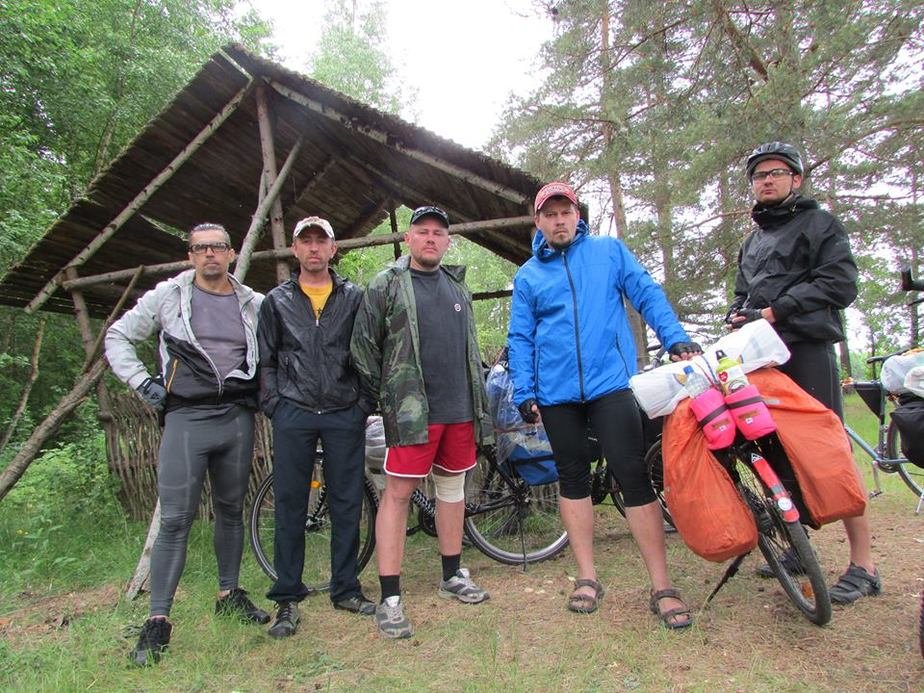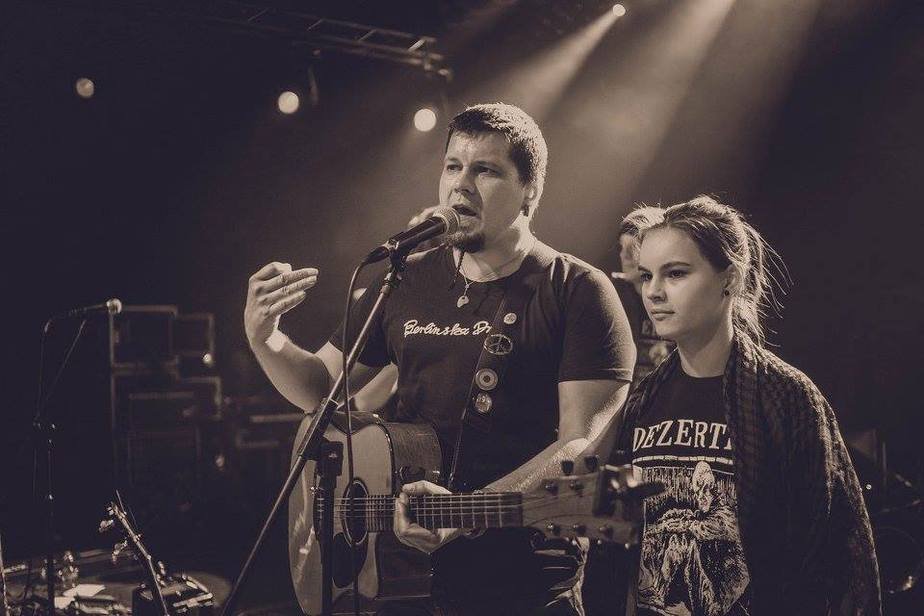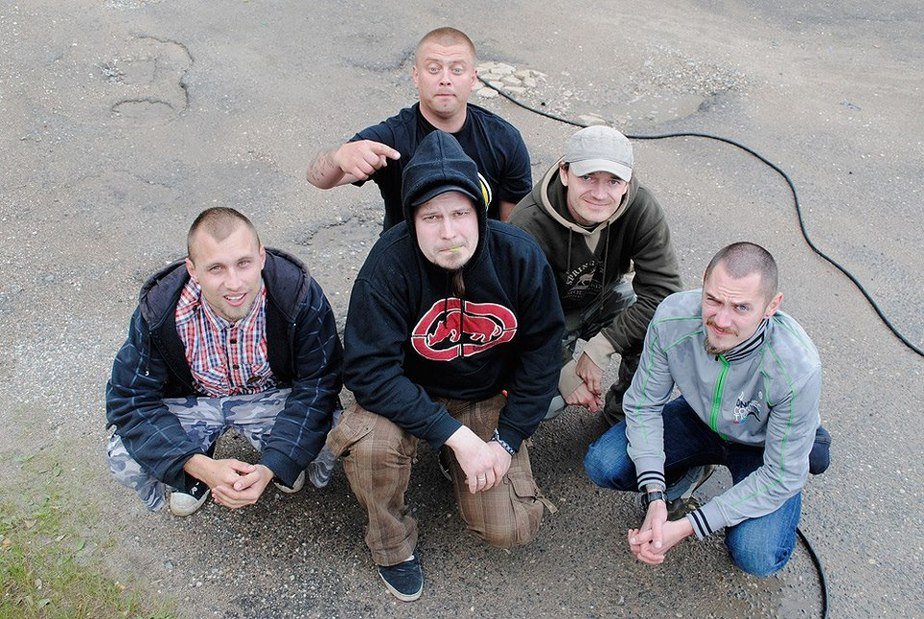The band Dzeciuki has been on the notorious music blacklist, an unofficial ban on performing in Belarus, for several years. Why is Ales Dzianisau no longer allowed to work at school? What is “Hrodna identity”? What principles does the musician use in raising a daughter? – read it in a big talk with Dzeciuki’s frontman.
Nadzeya Krapivina
Project Citizen Journalism
– I know you are a big fan of camping, cycling and kayaking. Did you go camping last year?
– I had two tours, if we don’t count small trips at weekends – a four-day kayaking tour and a cycling one. Cycling trips have been our tradition since 2006. Sometimes I have two biking trips a year. For example, in 2010, we had a tour around Belarus and a trip in the Carpathians. We kayaked on the rivers Nevisha and Kotra. It was warm on the first day, but on the last day, May 9, it was snowing!
I turned to kayaking four years ago. In the latest trip, I even got our guitarist Lyokha and bassist Python hooked on touring and camping. Python got the taste and plans to join us on a cycling trip next year. Pasha Trouble is an experienced tourist. We began camping together even before Dzeciuki.
It’s fantastic if someone can earn his leaving with his hobby. I can’t, I have another job, but I don’t lose connection to tourism. I just like camping. I like it since my childhood. Our head teacher, Uladzimir Anatolyevich Viktarau, took us on a couple of real camping trips. I like camping since those times.
– When did you develop an interest in history? Also at school?
– I read many adventure books relating, directly or partially, to history – Robert Stevenson, Rafael Sabatini, Ernest Thompson Seton, Yanka Maur, Alfred Szklarski, Jack London, James Fenimore Cooper, Louis Boussenard, Anatoly Rybakov. Later, I discovered books by Uladzimir Karatkevich. I didn’t learn Belarusian history at school. The subject was introduced only at the end of the 11th grade, because I finished school in 1992.

I then studied at the Faculty of History at the Hrodna State University. On the one hand, I wanted to get into the university, on the other hand, it disappointed me. There were different teachers. I became interested in history thanks to Henadz Semianchuk and Aliaksandr Krautsevich. The former taught Belarusian archaeology, the latter was in charge of the archaelogical practice. In 1993, I took part in the dig at the site where St Mary Church had stood. I had other interesting teachers. Unfortunately, many of them were expelled… For example, Sviatlana Yauhenyeuna Silverstava. Later, the faculty was destroyed. There is no more faculty of history as an independent structure...
– Did you want to work at school or you were made to?
– In the USSR, studying at the faculty of history was prestigious. Many graduates of the faculty became party officials. But I can’t imagine myself being a party official. In our time, some of my fellow students chose public service careers – some went to the customs service, the police or the KGB, but some chose science… I have two paths – science or teaching at school, because the compulsory job placement system was introduced. I chose teaching at school. As a result, I stayed there longer than I initially planned.
By the way, it was normal at school. Of course, I made mistakes. Now I know what I did right or wrong. The main thing is that I was able to find a common language with children. I liked working both with small childrenand older pupils. With small children (5th or 6th grades), I used ‘vy’ [the polite ‘you’] to show them they have dignity and make them understand they are adult. Then I gradually shifted to ‘ty’ [the informal ‘you’].
I lacked scientific knowledge, I didn’t read a lot of books on teaching, I often followed my intuition. I think it’s important to find a common language with children, encourage them to speak about the things they are worried about and discuss their problems rather than just teaching history. During classes, I did things a classic teacher would never do – we could move away from the topic and talk about football or music. I still think that a teacher’s primary task is to teach children to be kind, be their friend, teach them kind ideas, raise humanity, while teaching your subject is a secondary task.
– Would you like to return to teaching?
– They won’t allow me, because I am “an enemy of the state”. If a had a choice, I wouldn’t want it all the same. Bureaucracy and ideology kill real teaching. Also, teachers don’t have free time – when people relax after working hours, teachers prepare new lessons or check tests. If it were profitable financially… You probably know that teaching is one of the lowest-paid jobs.

The situation has hardly improved by today. I doubt I would have an opportunity to go on a tour with my band in November, for example. I am a bit spoilt by freedom.
– Has your job as a school teacher helped you in your life?
– Only in a bad sense. Guys tell me at rehearsals: “Well, turn off the teacher!” It’s inside my head, you don’t control it. I think my past as a school teacher gives nothing good. I read somewhere that teachers in the US can’t be jurors if they have worked at school for 10 years, because a person is considered to become psychologically unstable. I had worked as a school teacher for 10 years and two months! My case is totally hopeless.
– What principles do you use in raising your daughter?
– My wife and I try to give her more freedom, but there still must be some rules. How do our people behave? They see everything either black or white, either total control or do whatever you want. I think it’s wrong. My daughter takes after me – she is a bit lazy. She needs to be pushed. We are the parents, we must take responsibility and guide her. But without total coercion. There’s a Japanese proverb “Our children are the arrows we send into the future”. I understand that my “arrow” has been sent already, and I shouldn’t create it in my image. You shouldn’t make your children fulfill your unrealised dreams. Every person is an individuality with their own path of life and the right to make mistakes.
Of course, I’d like her to listen to my advice. For example, I want her to listen to classical music more and watch good films. Sometimes I send her a link, like “Look what an awesome documentary!” or “Listen the band I’ve found!” I don’t know if she watches and listens to it. It doesn’t matter. My task is not to impose something, not to make her do something, but to share information with her.
She is finishing the music school now. I don’t know if she will choose music as her profession, but music education is very important for everyone. Frankly speaking, I would introduce music lessons at school, but not how it is implemented now, I want all children to play an instrument twice a week. I can’t give scientific evidence, but I am convinced that music education expands a person’s boundaries of development.
– What does your daughter think about your music?
– I think it’s not comfortable for her to criticise my music. I am a father for her, a person she respects. Maybe she doesn’t like something, but she has never told me. Probably, one of the reasons is the age. I don’t think we can argue as equals at the moment. But I know she likes my lyrical songs more than protest ones.
We performed the song Ordinary People together at two concerts in Poland. It was my idea, but she was happy – singing with your father to a big audience is cool! But you shouldn’t turn it into a circus. We did it twice, and it’s enough. Let her master her piano playing to perform with me later.
– The band Kalyan has the song Harodnya in its latest album. It contains the following words: “We have our own culture, our roots!” Do you agree there’s a sort of Hrodna snobbery, which is well illustrated by the story of Veyshnoria?
– There is snobbery. Krakow, Saint Petersburg, Lviv have it too. But there are some good points. People are proud of their city, because it differs from others, has its unique “face”. In my view, it’s not chauvinistic disregard of other cites, not lust for separatism. Moreover, I sometimes feel ashamed for these Hrodna residents. When the city centre was being destroyed, most locals didn’t care about it...

As for Veyshnoria, it was a game, it was for fun. I don’t believe in Russian provocations and evil FSB officers. People really want to be involved in the country’s political life, so they picked up that idea of an ephemeral Veyshnoria to be able to make decisions at least on the internet. We have just one politician who rules the country and makes all decisions, so the Veyshnoria game was like an escape. Of course, the Hrodna spirit had its role. Perhaps, if it had happened in Homel or Babruisk, it wouldn’t have been such fun.
I need to admit there are manipulations everywhere. In so called democratic countries, for example, it is a common practice to create a myth that people are really engaged in political life though politicians there do whatever they want, by and large. However, they have alternatives – civilian control and a strong influence on the political elite. Democracy is best seen in the countries where local councils have more rights, like, for example, in Sweden or Switzerland. Most decisions are made on site, in local councils.
What does it mean? We – our yard, our street, our block – gather to solve our problems. We have our local funds. We know what we need. It is really close to the ideals of democracy.
– Have your thought of leaving the country?
– I am rather conservative in what concerns living conditions. I don’t like radical changes. I had some radical changes in my life, but I don’t want to repeat it. This is my country, I live here, I feel as a Belarusian, a Hrodna resident, a local, someone who was born here. It is said your home country is where you feel good. I don’t quite agree. It’s important for me to feel that I belong to here, to feel the foundation.
It’s also closely connected with the language and mentality. I don’t think I would feel like part of German society. There are countries where I would feel more or less comfortable. Poland, Slovakia… I had lived a year in Warsaw. On the one hand, there were some advantages, but on the other hand, my family was here while I was there…
– What is the latest book you’ve read?
– Radziva Prudok by Andrus Horvat. I really enjoyed it!
– What books have shaped your worldview?
– A lot of them. I really like Remarque. All Quiet on the Western Front is one of my favourite books. If we take Russian classics, it’s Chekhov. I’ve read all his works except for letters, because reading someone’s correspondence is like spying on a person.
From Belarusian contemporary writers, I really like Viktar Martsinovich. If we speak about Belarusian classics, I think Vasil Bykau and Uladzimir Karatkevich are symbols of our literature. I can confess in public that I hadn’t read his poetry for a long time because I didn’t know he wrote so many poems. I discovered it only four years ago.
¬– Do you say all things you want to say through your music?
– Of course, I don’t. We all have restrictions. For example, I can create and develop something only in the boundaries of non-professional music. There are a lot of other subjective things. Music preferences, for example. I’ve heard certain things and hasn’t heard others. It reduces opportunities for self-expression. This is true for all musicians.
On the other hand, I come from the Hrodna punk scene, but it doesn’t mean I’ve listened exclusively to punk rock. All my solo projects are close to certain songwriters I listened to, for example, Bulat Okudzhava. Polish and Russian rock music had a great influence on me.
– Is filming just a job for you? Don’t you want to develop as a professional?
– I’d like to. I’d like to film animals and birds. I would wait in a hide to make good shots. But we don’t have such TV shows, I don’t have the necessary equipment and also time. I need to earn money, but I can’t make a living doing what I love.
– Do you consider yourself part of a subculture?
– I came from punk rock, the movement where libertarian and anarchist ideas are popular. Punk rock itself is anti-systemic, it destroys standards. Today, I can’t put any label on me. I don’t want to be part of any group or subculture, because all of them have their boundaries. There are people with radical views who lead these groups, turning themselves into custodians of traditions, the unbending subculture Areopagus. If someone doesn’t follow the rules, he is declared a traitor. Siarhei Mikhalok once said in an interview that subculture censorship is much stricter than state censorship. I didn’t fully understand him then, but now I clearly understand it.
Any subculture restricts you. The difference is that some are more totalitarian and others are more anti-systemic. Libertarian. But any of them has its limits, its boundaries. Even the most radical anti-system creates its own system.
I went beyond the subculture thinking. I don’t want to return there. It doesn’t mean I have come to mass culture or, on the contrary, to some elitism. The matter is that any subculture claims to be elitist – you are different from the “grey” crowd, so you mean something. Elitism is special clothes, different music and the feeling of belonging to a certain company, but no one thinks about it. On the other hand, if you despise the crowd so much, why don’t you think you are living among these people? It’s a sort of teenage maximalism. While it is normal for a teen, identifying yourself with a subculture looks childish for men in their late 30s.
– What worldview does Ales Dzianisau have now?
– I can call myself a humanist. I think universal human values must be the pillar of any reasonable person’s worldview. I don’t think I’m anthropocentric. People do so many bad things on planet Earth that we can regard mankind as a virus.
Christian values are important for me, too. I can’t say I am religious. The church is a man-made organisation that often appears as a public institution raising money for its own needs and helping the state to rule. Attempts to figure our which religion is true is fucking shit! There’s no need in digging into the historical past. Islamic State is enough. Lust for blood, barbarity, blind hatred towards people of other faiths. And this is in the 21st century!
The might is right principle is a dead end in human development. We are not Australopithecus, we have moved away from savagery. We need to declare that people are partners or good neighbours in a broader sense rather than competitors. If we brandish truncheons we will only kill one another. Especially now, when certain rulers possess nuclear “truncheons”.
Subscribe to our mailing list: